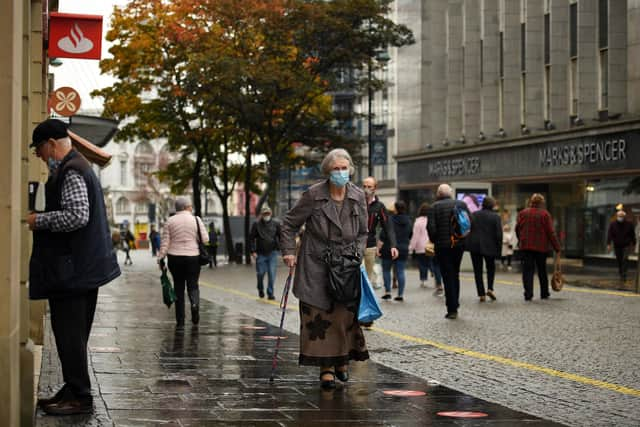Sheffield Covid infection rate could fall below 100 for first time since September next week
and live on Freeview channel 276
The number of infections per 100,000 people in Sheffield has fallen steadily from a high of 500 in October to 124 as of Tuesday, having been as low as 21 in June 2020.
Louise Brewins, head of public health performance and intelligence at Sheffield City Council, said there is evidence the rate of decline ‘is picking up a little pace’ after it fell by more than 100 over the last month.
Advertisement
Hide AdAdvertisement
Hide AdShe told The Star: "The reason the rate isn’t currently coming down faster than this is because of the new Kent variant, which we know is more transmissible.


"This is the dominant variant in Sheffield now and it means that it is taking longer for us to reach a case rate below 100 per 100,000 although, if the current trajectory holds, then we should achieve that within the next seven to 14 days.”
On the months ahead, Dr Andrew Lee, reader of global public health at the University of Sheffield, said: “I think we can be cautiously optimistic. If the vaccines work and we get enough of the population vaccinated, we can get some semblance of normality towards the end of the year.
"It's really important that we share this cautious optimism with the public because everyone is tired, everyone is weary. We just need to help everyone get over the line. I'm sure the mental health consequences on our population are enormous, never mind the business ones.”
Advertisement
Hide AdAdvertisement
Hide AdThe latest publicly available data shows the infection rate in Sheffield was slightly above the national average in the seven days to 12 February at 127 per 100,000 people, compared to 125 nationally.
There were 216 cases in Rotherham during this period, 187 in Doncaster and 178 in Barnsley.
Dr Lee said: “I suspect it's got to do with the economic deprivations we have got in our area.
“We will have a lot of people with insecure jobs, low pay, they have got a mortgage, debt and they have got to keep working. I suspect a lot of infections are taking place in workplace settings among adults who can't work from home."
Advertisement
Hide AdAdvertisement
Hide AdMs Brewins said it’s likely infections will ‘plateau for a period of time’ when the city reaches double figures again.
She added: “Reaching the levels we saw in Summer 2020, however, when the case rate was around 20 per 100,000 is more difficult to judge because much will depend on the scale and pace at which current restrictions are lifted, circulation of new variant and impact of the vaccination programme.”
Lifting restrictions too soon could result in new strains of coronavirus resistant to vaccines and ‘undo the hard work and sacrifices’ the country has made, Dr Lee warned.
He added: “At the back of my mind the virus can always mutate to become worse than it already is.
"It's not to say it's not going to happen but we must not take this virus for granted.”